Tbilisi Silk Road Forum connects thousands to “make tomorrow resilient”: insights from 4th edition
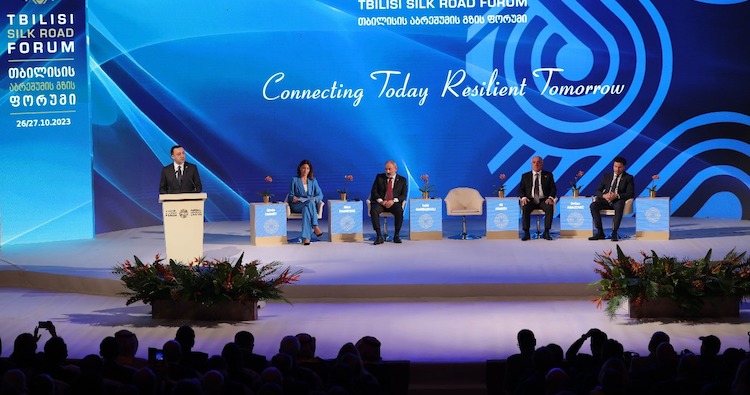
Georgian Prime Minister Irakli Garibashvili speaking at the Tbilisi Silk Road Forum. Photo: Tbilisi Silk Road Forum

The Tbilisi Silk Road Forum, a “truly global-scale event for dialogue among senior government officials, policymakers, businesses and community leaders” as it was described by Georgian Prime Minister Irakli Garibashvili, has closed with new agreements, investment decisions and goals set.
During the two-day event, hosted in the Georgian capital between October 26-27, the Forum gathered almost 2,300 guests from 63 countries, governments leaders, ministers, heads of international institutions, CEOs and top managers representing up to 250 companies.
The mission and main theme of this year’s Forum was Connecting Today Resilient Tomorrow, while the Forum’s key topics for discussion included new architecture of the East-West Trade, increasing role of the Middle Corridor - a logistics route connecting Central Asia and China to Europe via the South Caucasus - as well as digital connectivity, diversification in the energy sector, tourism sustainability, and diversified investments for resilient future.
The fourth edition of the Forum founded by Garibashvili was building on the success of the previous events hosted in 2019, 2017 and 2015.
Vice Prime Minister and Economy Minister Levan Davitashvili sums up Tbilisi Silk Road Forum.
Importance of Silk Road historically and presently
Centuries ago caravans loaded with silk and spices from China were travelling all the way to Europe and the British Isles. Today the caravans are replaced by modern highways, railways and pipelines through which modern "silk and spices" - energy, natural resources and manufactured goods - are transported.
Through this new Silk Road, the Georgian Government has an ambition to link China to Europe with the shortest way that enables the country to transport cargo to Europe, with the Government taking actions to restore its strategic importance as a transportation and infrastructure hub of the wider region and create a transit corridor between Europe and Asia.
Speaking at the Forum last week, Garibashvili highlighted the significance of the Silk Road, both historically and presently, saying it “extends far beyond mere trade”.
Beyond the famed silk, this ancient route facilitated the exchange of porcelain, flourishing of tea culture and a vital connection between Europe and Asia. In doing so, it bridged Western and Eastern cultures, serving as a conduit for the propagation of innovations and knowledge.
Our historical connection to the Silk Road is undeniable. Before this ancient road extended westward, it found its path through the diverse terrain of Georgia, documented by Greek historians as a pivotal crossroads in the global trade network. Our country’s role in this epic journey is substantiated by archaeological evidence, such as shards of Chinese porcelain in Dmanisi [town in Georgia] and the discovery of a Chinese coin dating back over 1,200 years in Mtskhetijvari [village archaeologicla digs]”, he said.
From prehistoric days, Georgia’s ancient capital city of Mtskheta served as a vital logistical nexus along the Silk Road, where the primary routes of the Caucasus converged.
The Forum released a video highlighting the history of the Silk Road and its role in trade.
Garibashvili said nine years ago he had conceptualised the significance of the Silk Road at the United Nations General Assembly, while a year later, in 2015, he brought the first Forum to the heart of Tbilisi.
Since then, our nation has been steadily building upon this legacy and today there is no doubt that Georgia has become an integral part of East-West exchanges”, he said.
The rise of the Middle Corridor as a third vector of Eurasian connectivity
Among the many significant geopolitical consequences of Russia’s war against Ukraine has been the reinvigoration of the Middle Corridor as an increasingly attractive alternative route between Europe and China. Together with a Covid crisis that created problems in the logistics chain, the war caused an energy crisis and a shortage of gas in Europe.
In search of the way out of the various crises around the world, the visiting officials of the Forum pointed out Georgia could use the established situation and its strategic geographical location, as a country bridging Europe and Asia, and become a hub.
In his comments, Garibashvili said the Middle Corridor was fast emerging as a “stable and secure alternative” to traditional routes.
It has already become one of the shortest and most reliable East-West transportation options. Currently, we are closely working with our Azerbaijani and Kazakh colleagues to eliminate bottlenecks by improving infrastructure capacities, simplifying procedures and applying unified tariff policy”, he said.
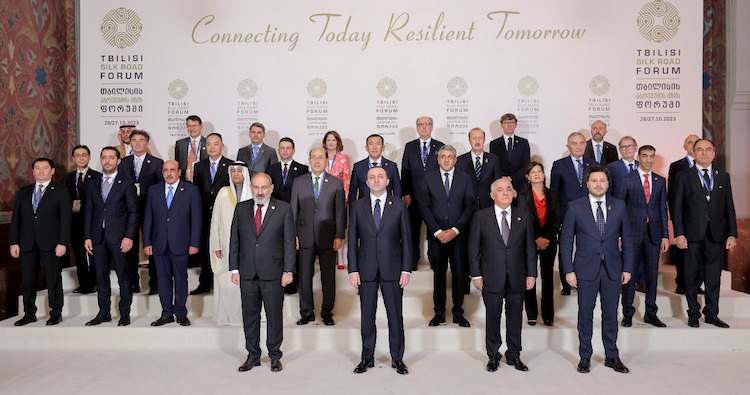 High-level officials at the Tbilisi Silk Road Forum. Photo: Tbilisi Silk Road Forum
High-level officials at the Tbilisi Silk Road Forum. Photo: Tbilisi Silk Road Forum
The PM told the Forum his Government was “heavily investing” in large-scale infrastructure projects - such as the Anaklia deep sea port, Black Sea submarine electricity cable initiative, Black Sea underwater fibre optic cable idea, railway modernisation, the East-West Highway development, a new Baku-Tbilisi-Kars railway line, new international airport in Tbilisi - to augment Georgia’s position as a regional hub.
He also said free trade agreements Georgia had signed with the European Union, European Free Trade Association, Commonwealth of Independent States, China, Turkey and the United Arab Emirates “further enhanced” the country’s emerging status in the role.
These agreements already provide investors with access to vast markets, yet the economic policies of our Government additionally encourage investors to expand their businesses in Georgia and take advantage of our access to a 2.3 billion consumer market. Negotiations with Israel and South Korea are underway as well”, Garibashvili said.
Georgia and China recently elevated ties to the strategic partnership level, which Garibashvili said boosted Georgia’s role as a link between the continents, fostering greater connectivity and economic collaboration.
Kitack Lim, the Secretary-General of the International Maritime Organisation, said at the Forum he saw a “higher level of enthusiasm and motivation from countries in the region” regarding the Middle Corridor project.
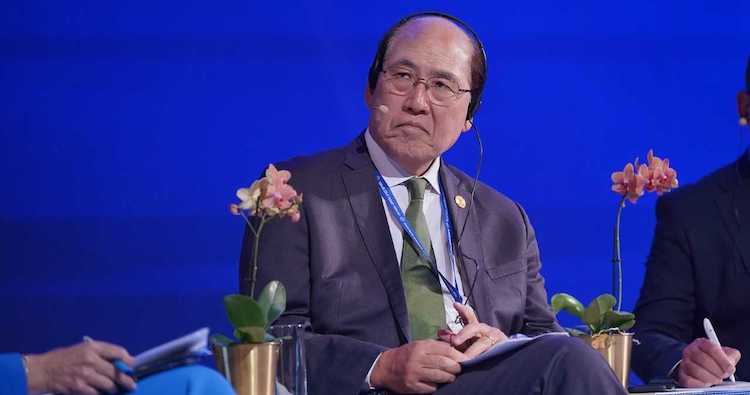 Kitack Lim, the Secretary-General of the International Maritime Organisation. Photo: Tbilisi Silk Road Forum
Kitack Lim, the Secretary-General of the International Maritime Organisation. Photo: Tbilisi Silk Road Forum
Lim said the Corridor would “greatly contribute” to the global economy and expansion of global trade from the point of view of the global supply chain.
Promoting connectivity and cooperation will benefit all people, especially the people in the countries of the region", Lim said.
Erin Elizabeth McKee, the United States Agency for International Development Assistant Administrator for Europe and Eurasia who headed the US delegation at the Forum, said the USAID was supporting Georgia’s participation in the Middle Corridor project.
Many of my colleagues from America say they are helping Georgia to create a single maritime window that will highlight its role as a regional country [...] The Middle Corridor offers [involved] countries the opportunity to contribute to and benefit from a strong trade relationship - transit, logistics, greater efficiency, production, we also heard of information technology”, she said.
Future of fintech in rising economies
Natia Turnava, the Acting Governor of the National Bank of Georgia, said Georgia would become a hub of financial technology for the Middle Corridor countries, an “enabler and facilitator” of regional cooperation encouraging new financial infrastructure.
We offer fintech companies and investors to work on a ‘one-stop shop’ basis. Any licence or permit related to financial services can be obtained in this manner. Similar practices cannot be found in many other countries. We perceive the role of the NBG as a basic fintech infrastructure enabler and facilitator for the entry barrier disruption in-house”, she said.
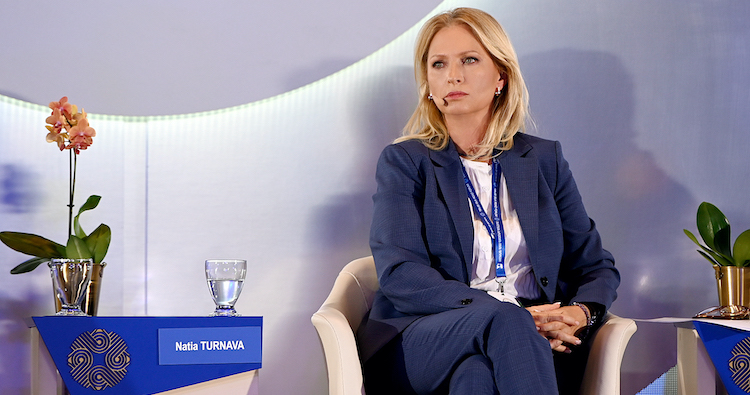 Natia Turnava, the Acting Governor of the National Bank of Georgia. Photo: Tbilisi Silk Road Forum
Natia Turnava, the Acting Governor of the National Bank of Georgia. Photo: Tbilisi Silk Road Forum
The Acting Governor of the National Bank highlighted several reasons for Georgia being an “attractive place” for being positioned as a regional fintech hub. She said the country had an open policy-driven fintech and digitalisation strategy, fuelled by fintech initiatives of regional cooperation.
Pat Patel, the CEO of Elevandi, a Singapore-based FinTech platform, found “good potential” for Georgia in development of financial technology.
It's evident that Georgia is on the right track. The focus now should be on formulating a 10-year roadmap to champion fintech's growth and adoption across the nation. By creating a strategic blueprint that draws on the expertise of the central bank, major financial institutions, and budding fintechs, Georgia can lay the groundwork for a robust FinTech community”, he said.
Deals signed by Georgia as part of the Forum
Georgian Economy Minister Levan Davitashvili said “important agreements” had been signed as part of the event for development of the Middle Corridor and supporting the employment of Georgian sailors abroad.
Georgia and Kazakhstan have signed a deal on the development and increase of the efficiency of the Middle Corridor, which will cover the roadmap for the development between 2022-2027.
Davitashvili also said a joint company had been established by the railways of Georgia, Azerbaijan and Kazakhstan and would serve containerised cargo coming from China. The Minister added the company would help to increase coordination and efficiency in the Middle Corridor.
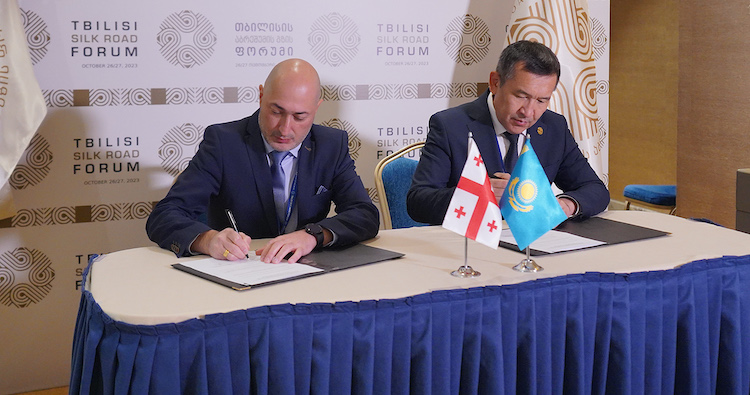 Photo: Ministry of Economy
Photo: Ministry of Economy
A memorandum of cooperation on mutual recognition of seafarers' certificates was also struck between Georgia and Qatar.
This agreement will allow Georgian sailors to have their qualifications recognised by Qatar, which will give Georgian sailors new employment opportunities”, Davitashvili said, adding Georgian seafarers' certificates were now recognised by 73 countries.
Connectivity
Lazăr Comănescu, the Secretary General of the Black Sea Economic Cooperation, highlighted the importance of connectivity in the background of the lately developed events that made a “significant” impact on many countries, including in the Black Sea region.
We need to work hard and concentrate more on how we can create effective relationships. Trade, in itself, implies connectivity”, Comănescu said, saying he hoped the announced projects and initiatives would be developed in a “mutually complementary manner”.
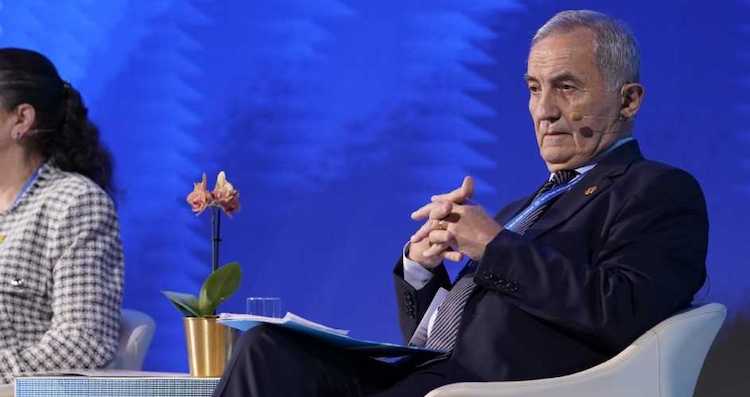 Lazăr Comănescu, the Secretary General of the Black Sea Economic Cooperation. Photo: Tbilisi Silk Road Forum
Lazăr Comănescu, the Secretary General of the Black Sea Economic Cooperation. Photo: Tbilisi Silk Road Forum
Lionel Rapaille, the Global Director of the European Investment Bank, said the Bank supported a number of projects in Georgia for the development of connectivity.
These are East-West Highway, renewable energy projects and others. We secured more than €4 million in funding with the support of the European Union. How to ensure proper connectivity is a key challenge. It includes large infrastructural projects and, therefore, it is necessary to find adequate financial support”, Rapaille said.
Tourism Beyond Borders at Tbilisi Silk Road Forum
Zurab Pololikashvili, the Secretary General of the United Nations World Tourism Organisation, highlighted the dynamics of recovery in tourism in the post-pandemic period worldwide, while also mentioning tourist flows in Georgia were quickly returning to figures of the pre-pandemic 2019.
The UNWTO official also said developments taking place in the private sector in Georgia by noting establishment of new companies, and opening of hotels and new tourist facilities, would “ultimately benefit people employed in the sector”.
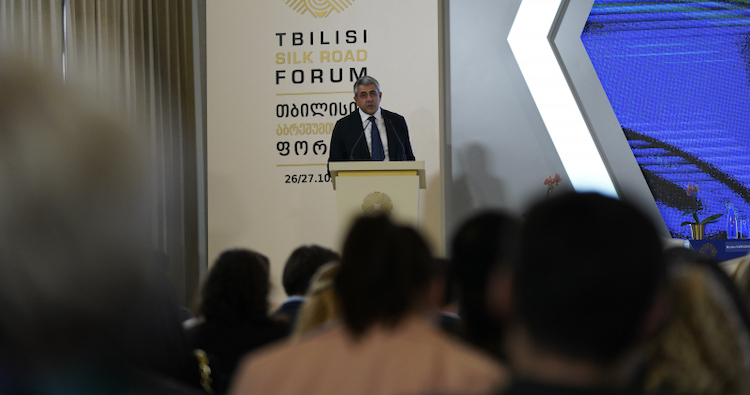 Zurab Pololikashvili, the Secretary General of the United Nations World Tourism Organisation. Photo: Tbilisi Silk Road Forum
Zurab Pololikashvili, the Secretary General of the United Nations World Tourism Organisation. Photo: Tbilisi Silk Road Forum
He also welcomed the Georgian Government’s decision to introduce visa-free travel for Chinese citizens, saying the initiative would help increase the number of Chinese tourists in the country.
Pololikashvili announced the UNWTO was planning to open its academy in Tbilisi together with the Government of Georgia, pointing out there was “great demand” for tourism education in Georgia, and it was “very favourable” to invest in the country in this direction.
 Tweet
Tweet  Share
Share